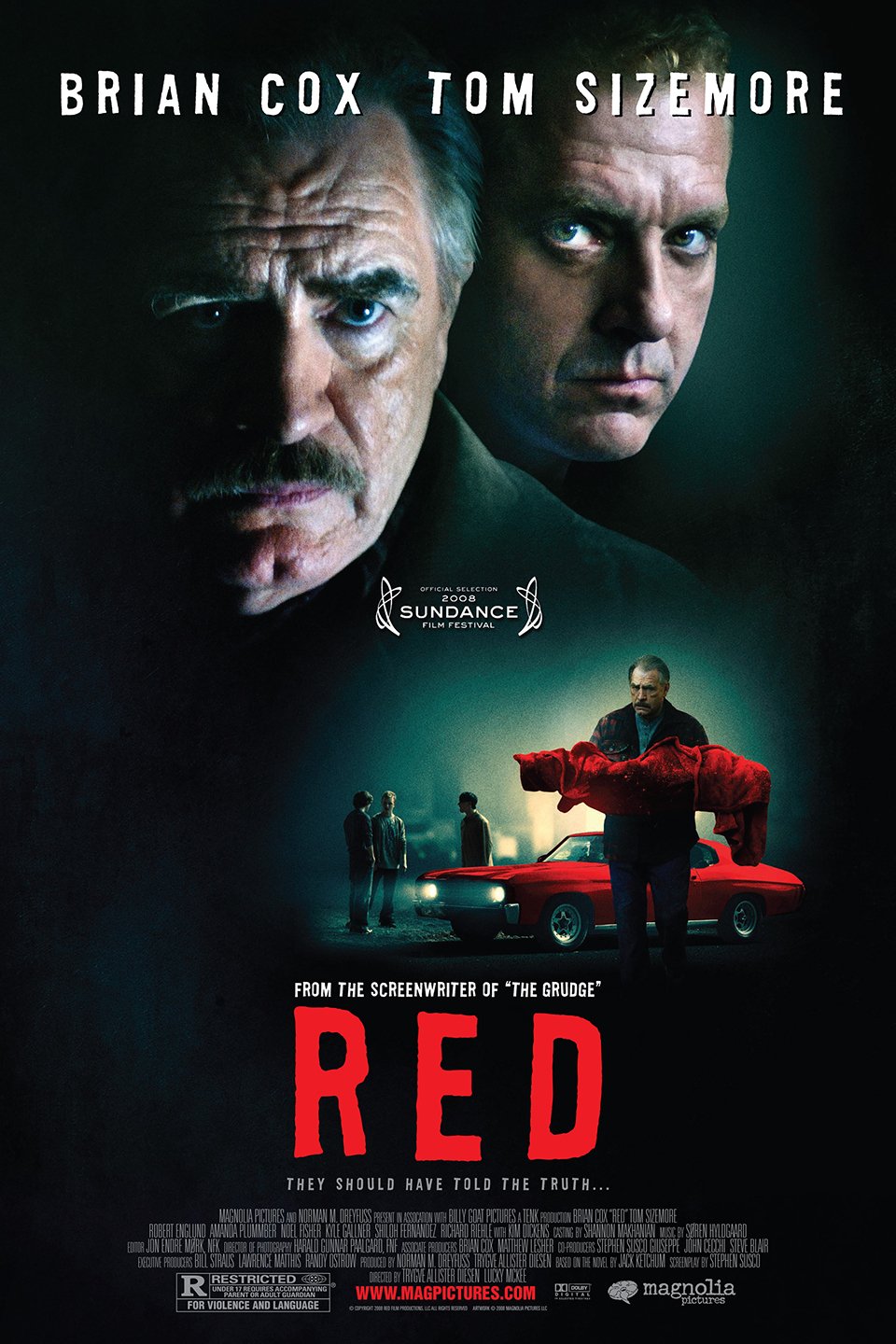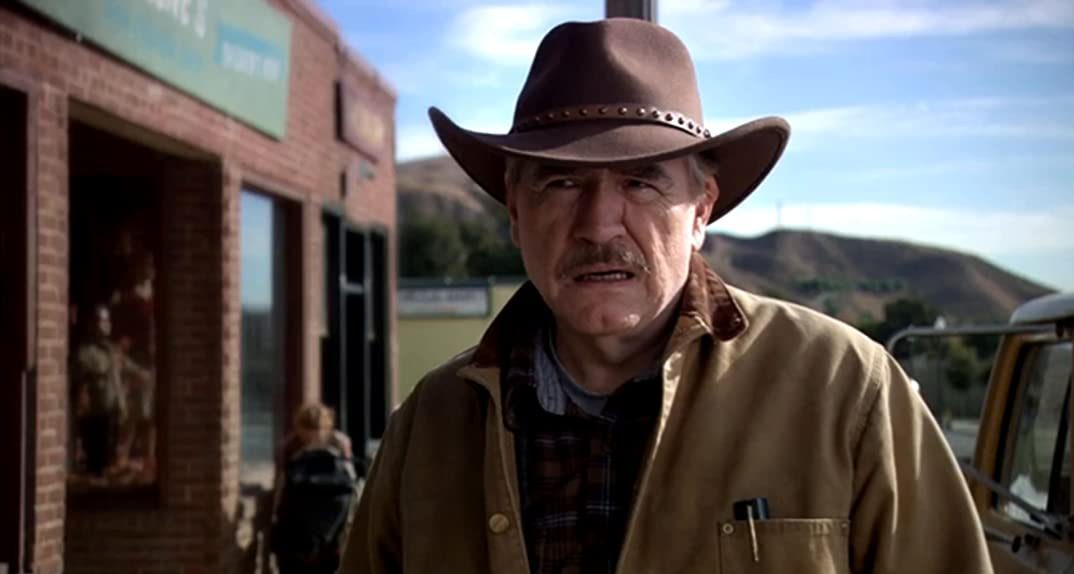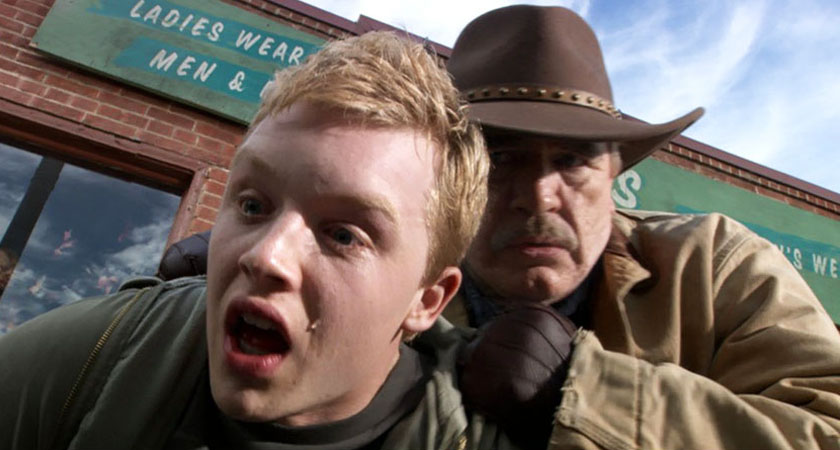

“I won’t say you’re welcome to it but I’m not gonna argue with a shotgun either.”
Virtually every revenge thriller begins with some sort of egregious moral violation that leaves deep emotional wounds in the protagonist. A murder, a rape, a kidnapping. The target of the crime is typically someone close to our hero, usually a family member. In Red, that family member happens to be the eponymous raggedy old mutt, Avery Ludlow’s (Brian Cox) sole companion. Although the Keanussance puppy-revenge thriller John Wick has lifted its general premise and the Bruce Willis action-comedy Red has stolen its simple title (strangely enough, that film also features Brian Cox) this modest little tale of vengeance gone awry is a pleasant surprise. It’s not groundbreaking, but solidly constructed with a natural dramatic flow and a solid leading performance.
Let’s cut to the chase—they kill the dog. In the very first scene, as Ave is enjoying an idyllic afternoon fishing at his tranquil honey hole, he’s confronted by a trio of surly teenagers, led by the sadistic Danny (Noel Fisher). The rowdy youngster is looking to separate Ave from the vast fortune that he suspects the solitary man carries in his breast pocket and he waves a shotgun in his face to persuade him to hand it over. Ave calmly, placatively informs the boys that they’ll find $30 in the glove box of his truck and hands over his keys. Infuriated by his luck, Danny turns the threatening shotgun toward the gentle fisherman’s loyal friend and impulsively pulls the trigger. Then he pulls the trigger again, and again. He seems to take delight in his actions, gleefully laughing at the life he has destroyed. It’s a brutal scene, truly; a senseless tragedy that Ave will struggle to comprehend throughout the film as he seeks a simple admission of guilt.
Dog deaths are one of those weirdly touchy cinematic subjects. If you think about how many times the average American has seen a human death depicted on screen, it makes no sense that we get squeamish when a dog is killed. But it’s a classic case of desensitization—we simply haven’t seen enough dogs die for it to feel normal the way that seeing humans die feels normal. Maybe that says something very sinister about how movies warp our brains, but I’m just calling it how I see it. Anyway, doggy deaths are essentially a shortcut to inflicting trauma upon the audience, getting a leg up on a dramatic story arc, making a climax feel extra depressing, etc. In Red, from the moment the heinous crime occurs before our eyes, even though we barely know Ave at all we feel that he is totally justified to retaliate in whatever manner he chooses.

If your stomach can handle the puppy slaying, the ensuing quest for justice is unexpectedly layered, unfolding with methodical precision and a sense of realism. Death Wish this is not. A simpler film would have shifted gears into a typical vigilante action flick, but rather than seek vengeance directly, Ludlow walks tall, seeking a simple acknowledgement of the wrong done to him and his pet. First, Ave finds out where the boys live and tries having a conversation with their menacing, enabling father, Michael McCormack (Tom Sizemore). Striking out there, he next tries an unsympathetic sheriff, then a small-time attorney (Richard Riehle) who can’t compete with the McCormacks’ big shot lawyers. Eventually, he finds himself on the local news when his story is picked up by an optimistic journalist (Kim Dickens) who thinks social pressure will help solve the problem. Eventually, he circles back around on the McCormacks, the exhumed corpse of Red in his arms, exhorting them to right their wrongs. It’s his persistent pestering of the boys’ father that leads to the film’s tragic conclusion.
The standout here is Brian Cox, who is seldom cast as a leading man but has more than adequate chops to do the job. As Avery, a man who belongs to the era before his own, he’s a melancholy loner who is more upset with the environment that created his adversaries than the troubled teenagers themselves. It is inconceivable to him that so many people can bluntly refuse to take personal responsibility for their own actions. There’s a moment of vulnerability, perhaps overly long and indulgent but totally engrossing, in which he shares how his wife and child died. It’s a twisted, violent story that is meant to draw parallels to the death of Red, perhaps even contextualizing Ave’s persistence in the present as a way for him to achieve symbolic justice for the sins of the past. It’s this deliberateness that allows us to empathize with Avery’s misery and confusion in the face of random acts of severe cruelty.

An issue arises in the film’s final third, as the script that was so thoughtful in the early going takes a turn for the contrived, veering off into a shockingly violent finale that feels at odds with the measured action of the buildup. It works fine—it’s well executed and wraps things up in standard theatrical fashion—but it left a bad taste in my mouth because I was hoping for something gentle and intelligent befitting of Cox’s intricate performance. But then again, this was based on a novel by pulp horror author Jack Ketchum, so perhaps the beginning of the film is the part that doesn’t match. I think this juxtaposition of temperaments may stem from the shallow caricatures that function as supporting characters. The cast—which is fleshed out by Kyle Gallner, Shiloh Fernandez, Robert Englund, Amanda Plummer, and Ashley Laurence—is roundly exceeding the limits of their skin-deep characterizations, and so for a large portion of the runtime Red feels like it may have some depth that, in the conclusion, we find it does not (excepting the character of Avery Ludlow). Still another source of disruption could be the switch in directors midway through the project. Initially, indie horror filmmaker Lucky McKee was at the helm, but he was replaced by Norwegian director Trygve Allister Diesen. This may be why the finale features heavy usage of silhouettes.
Despite some hiccups, inconsistencies, and deficiencies, Cox’s terrific performance is enough to elevate Red into a legitimately good film. He’s in virtually every scene, and his descent from upstanding military veteran and general store owner into moral uncertainty is virtuosic. As he strips Ludlow of each successful layer and sharpens him into a fiend hellbent on bringing the situation to a head, he manages to retain our empathy even while continually misstepping. It has some foibles, but not so many that so few people should have seen it.